

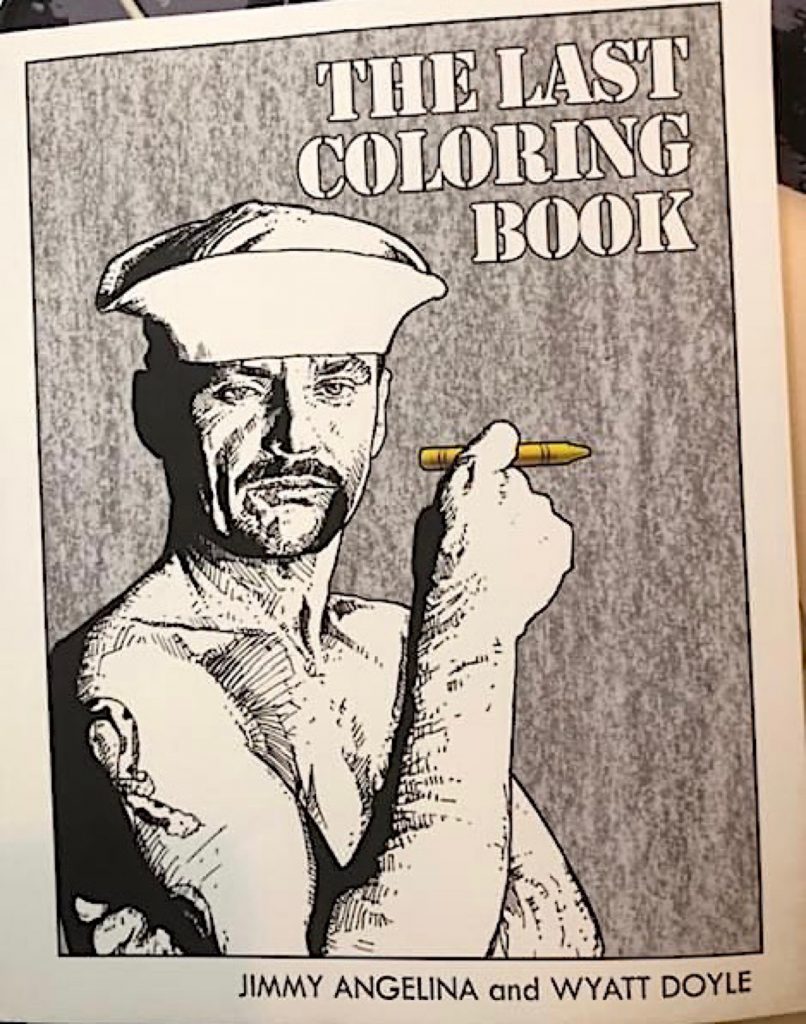



…was that just her way of saying he was an incorrigible hound? Consider my 10.17.21 review of John Farrow: Hollywood’s Man in the Shadows. And, for that matter, Marilyn Moss‘s “The Farrows of Hollywood: Their Dark Side of Paradise” (Skyhorse, 4.11).
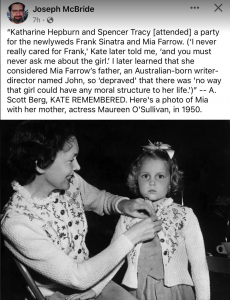
I’m afraid that the notion of John Magaro receiving some Best Supporting Actor action for his performance as “Arthur”, the trusting but slightly dumbfounded husband of Greta Lee‘s “Nora” in Celine Song‘s Past Lives…I’m sorry but that’s a likely ixnay.
Oscar noms generally don’t go to short** bearded guys who play bright, sensitive sad sacks with floor-mop hair. Magaro is a smart, expressive actor, but Arthur is essentially passive and kinda wimpy. I never thought of him as someone I’d like to emulate.
Confronted with the fact that his playwright wife is still in love with her childhood sweetheart (“Hae Sung”, played by Teo Yoo) and that she seems to be pondering the idea of switching horses, Arthur’s basic thing is “ohh, gee…I might wind up getting dumped here…well, I guess I have no choice but to play it cool and low-key and show some understanding to my dear wife and basically say ‘well, honey, I understand what you’re feeling but I hope you don’t, like, leave me for this slightly taller Korean guy…uhm, you know, whatever.”
** Magaro is somewhere between 5’5″ and 5’7″ — that’s at least one inch shorter than Humphrey Bogart and possibly the same height as Alan Ladd.
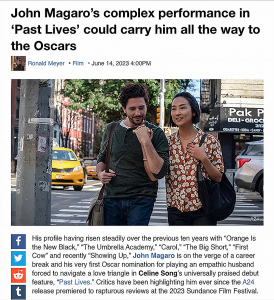
I reviewed Wes Anderson‘s Asteroid City (Focus Features, 6.16) in Cannes just over three weeks ago. It’s opening tomorrow so I may as well re-post. I’ve said at least a dozen times that Wes doesn’t seem to want to expand or deepen his artistic reach. He makes standard issue WesWorld movies, and he’s going to stick to the brand and that’s that. Take it or leave it.
Posted on 5.23.23: Wes Anderson‘s Asteroid City (Focus Features, 6.16) would almost certainly be “another signature tableau exercise in WesWorld irony — zero emotion, wit, whimsy, staccato dialogue, a darkly humorous attitude, etc.”
Add in the other familiar signatures — formal framings, immaculate and super-specific production design, etc. — and that’s pretty much what Asteroid City is…quelle surprise!
Having been a conflicted Anderson fan for over 25 years and an Anderson friendo since ’94, it breaks my heart to say this once again, but Asteroid City is a whole lotta fun to splash around in, eye-bath-wise, but there’s almost nothing going on except the Anderson troupe reciting their lines just so.
Immaculate style (in this instance ’50s kitsch) mixed with bone-dry humor and not much else.
Yes, Asteroid City features a meaningless, blink-and-you’ll-miss-it Scarlett Johansson nude scene (nothing remotely close to that buck naked Lea Seydoux posing-for-Benicio del Toro scene in The French Dispatch).
And a delightful musical sequence featuring some wonderful Oklahoma!-like polka dancing, performed by Maya Hawke and Rupert Friend.
And a cartoonish, silly-looking alien with 1950s Warner Bros. animation department bug eyes who, in 1955, twice pays a visit to Asteroid City, the small-town site of a Junior Stargazers convention. Except the alien does nothing (no threats or love or anything in between) and has nothing to say or to teach like Michael Rennie did four years earlier…zip.
The song-and-dance sequence, which ignites with the joyful spirit of choreographer Agnes DeMille, indicates that Wes feels real affection for musicals. Perhaps if he had filmed Asteroid City as a sung-through opera?
But of course, he didn’t and probably couldn’t. Because (and again, it really hurts to say this) he’s been wrapped so tightly in his WesWorld aesthetic — dry sardonic humor, deadpan line readings, somber philosophical musings — that he can’t seem to bust out of it or has lost interest in doing so or whatever.
Remember when Wes’s characters went through actual human difficulties and occasionally expressed emotion? The kind you could relate to, I mean? Certainly in Bottle Rocket (Luke Wilson‘s glorious love for Inez, the motel maid) and Rushmore (romantic obsession, jealous rage) and more recently in Grand Hotel Budapest (bittersweet nostalgia for a certain elegant, old-world way of life that’s been washed away by time).
What is Asteroid City attempting to deal with, metaphorically or adult-behavior-wise or what-have-you?
The best I can figure is that it’s about complacency — several highly attuned, obviously intelligent characters who are, of course, nominally aware of the alien’s visit and are taken aback by this world-shaking event but can’t say or deduce or conclude anything of substance. Nothing means nothing, but they sure are surrounded by a lot of drop-dead southwestern nothingness (fake mesas in the distance, a huge tourist-attraction crater), and the film sure is an eyeful to look at. It’ll probably give you an occasional chuckle or, more likely, an LQTM moment.
Arnold (Netflix, currently streaming) is an engaging, charmingly sanitized doc about the life of Arnold Schwarzenegger.
His story is told in three chapters — childhood + bodybuilder (early ’50s to late ’70s), movie actor into movie star (’74 to present) and California governor (2003 to 2011).
I’ve never had any problems with Arnold’s moderately conservative philosophy (he was more or less a green Republican while serving in Sacramento), and I always felt…okay, it’s probably better to put the sexual stuff aside or into a separate box, although I’ve always loved the line “eating isn’t cheating.”
The best parts of Arnold are those the deal with his ascent — Austrian childhood, entering bodybuilding competitions at age 15, becoming a major bodybuilding champion in the ’60s and early ’70s, his small but amusing silent appearance in Robert Altman‘s The Long Goodbye (’74), and his first noteworthy supporting role in Bob Rafelson‘s Stay Hungry (’76), a laid-back comedy-slash-love story that’s always been one of my favorite ’70s films.
Watching Arnold actually led me to buying a Stay Hungry Bluray, which will arrive on Friday.

I’ve long admired Treat Williams‘ lead performance as Danny Ciello, a morally conflicted detective of Italian-American descent, in Sidney Lumet‘s Prince of the City (’81). But after learning of Williams’ death a couple of days ago I did a sentimental rewatch of Prince, and it hit me why that film, despite excellent reviews, never really energized Williams’ career.
Two reasons for this: (1) Williams’ performance was more about pushing than being, and (2) he didn’t look believably Italian.
John Travolta, Robert De Niro, Al Pacino and Sylvester Stallone always had that natural Italian-American streetcorner thing going on, but Williams looked like an impostor — like a fair-skinned, baby-faced, button-nosed WASP pretending to be an Italian by way of black hair dye, and so his intense, at times strenuous performance always felt like an attempt to “act” his way into being someone other than who he actually was.
I knew several Italian-Americans guys from the tristate area in my teens, super-urban guys who wore pegged pants and pointy leather shoes, and none of them ever looked like Williams. That pinkish-white skin plus that black hair dye…no sale.
There was always something a bit curious about Williams’ facial features, which were soft and rounded and and a bit fleshy. The son of an antiques dealer mom and a corporate executive dad, Williams had a Connecticut prep school lineage. His family moved to Rowayton, Connecticut, in early ’55, when he was three. He was descended on his mother’s side from William Henry Barnum, a U.S. senator from Connecticut and third cousin of the showman P. T. Barnum. Williams was also a distant relative of both Robert Treat Paine — a signatory to the Declaration of Independence — and President Herbert Hoover.
Natural Williams (light brown hair) vs. black-hair-dyed version in Prince of the City.
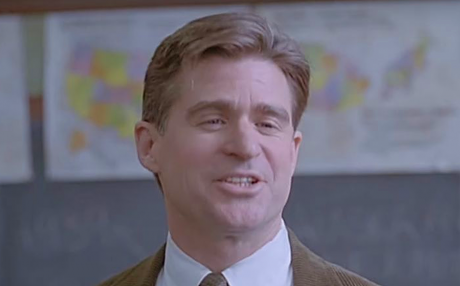
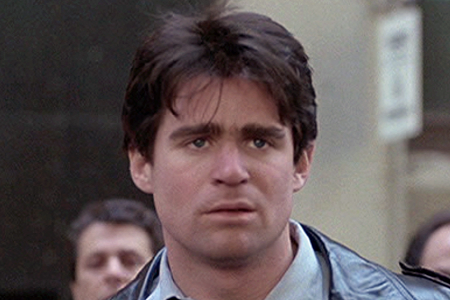
I never saw any of Glenda Jackson‘s landmark performances on the Broadway stage — not her Nina Leeds in Eugene O’Neill’s Strange Interlude (’85) nor her commanding titular turn in King Lear (’19) nor her Tony Award-winning perf in Three Tall Women (’18). And I never saw her perform anything in her 20s, and before this morning I’d never even noticed her bit as a partygoer in Lindsay Anderson‘s This Sporting Life (’63) when she was 26 or thereabouts.
It probably goes without saying that I paid very little attention to her political career, which lasted from ’92 to ’15.
All I ever knew and loved about Jackson came from her sweet-spot period, which primarily occured in the ’70s and lasted roughly a decade (’69 to ’80). It happened between her Oscar-winning performance as the eccentric and perversely feminist Gudrun in Ken Russell‘s Women in Love (’69), which was made when she was 32 or 33, and her second and final escapist comedy with Walter Matthau, Hopscotch (’80), when she was 43 or 44.
Jackson’s most emotionally relatable ’70s performance, hands down and no debating, was Alex Greville in John Schlesinger‘s Sunday Bloody Sunday (’71), a melancholy romantic triangle film that happens to be one of my all-time favorites.
Other performing highlight films from this period included The Music Lovers (as Peter Tchaikovsky’s doomed wife, Nina), Mary, Queen of Scots (as Queen Elizabeth), Bequest to the Nation, the sophisticated romcom A Touch of Class (which resulted in her second Best Actress Oscar), The Romantic Englishwoman (’75), Hedda, House Calls (her first comedy with Walter Matthau), Lost and Found (her second outing with George Segal, released in ’79), and the title role in Robert Enders‘ Stevie (’78), about the British poet Stevie Smith.
Jackson passed today (Thursday, 6.15) at her London home. She was 87.